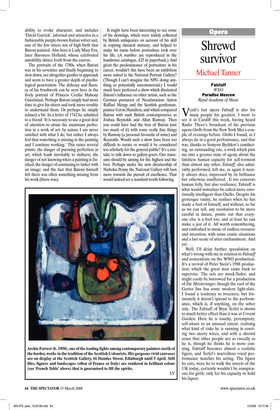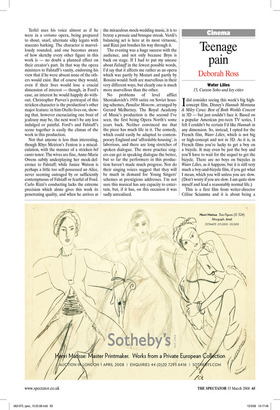Shrewd survivor
Michael Tanner
Falstaff WNO Paradise Moscow Royal Academy of Music
Verdi’s last opera Falstaff is also for many people his greatest. I went to see it in Cardiff this week, having heard Radio Three’s broadcast of his previous opera Otello from the New York Met a couple of evenings before. Otello I found, as I always do in a good performance, and that was, thanks to Semyon Bychkov’s conducting, an outstanding one, a work which puts me into a greater state of agony about the limitless human capacity for self-torment than almost any other. Falstaff, also admirably performed, left me, as again it nearly always does, impressed by its brilliance but otherwise unaffected. It too concerns human folly, but also resilience; Falstaff is what would nowadays be called more emotionally intelligent than Otello. Despite his grotesque vanity, he realises when he has made a fool of himself, and without, so far as we can tell, any resolution to be more careful in future, points out that everyone else is a fool too, and at least he can make a jest of it. All worth remembering, and embodied in music of endless resource and invention, with some comic situations and a last scene of utter enchantment. And yet...
Well, I’ll delay further speculation on what’s wrong with me in relation to Falstaff and concentrate on the WNO production. It’s a revival of Peter Stein’s 1988 production, which the great man came back to supervise. The sets are mock-Tudor, and might easily be borrowed for a production of Die Meistersinger; though the roof of the Garter Inn has some modern light-slats. I found a tendency to tweeness, but fortunately it doesn’t spread to the performance, which is, if anything, on the sober side. The Falstaff of Bryn Terfel is shown to much better effect than it was at Covent Garden. Here he is touchy, peremptory, self-aware to an unusual extent, realising what kind of risks he is running in courting two merry wives, and with a shrewd sense that other people are as rascally as he is, though he thinks he is more cunning. Falstaff becomes almost a realistic figure, and Terfel’s marvellous vocal performance matches his acting. The figure he cuts, were he to walk the streets of the UK today, certainly wouldn’t be conspicuous for girth; only for his capacity to hold his liquor. Terfel uses his voice almost as if he were in a verismo opera, being prepared to shout, snarl, alternate silky legato with staccato barking. The character is marvellously rounded, and one becomes aware of how sketchy every other figure in this work is — no doubt a planned effect on their creator’s part. In that way the opera ministers to Falstaff’s vanity, endorsing his view that if he were absent none of the others would exist. But of course they would, even if their lives would lose a crucial dimension of interest — though, in Ford’s case, an interest he would happily do without. Christopher Purves’s portrayal of this stricken character is the production’s other major feature: in him Otello lives on, showing that, however excruciating one bout of jealousy may be, the next won’t be any less indulged or painful. Ford’s and Falstaff’s scene together is easily the climax of the work in this production.
Not that anyone is less than interesting, though Rhys Meirion’s Fenton is a miscalculation, with the manner of a stricken bel canto tenor. The wives are fine, Anne-Marie Owens subtly underplaying her mock-deference to Falstaff; while Janice Watson is perhaps a little too self-possessed an Alice, never seeming outraged by or sufficiently contemptuous of Falstaff or fearful of Ford. Carlo Rizzi’s conducting lacks the extreme precision which alone gives this work its penetrating quality, and when he arrives at the miraculous mock-wedding music, it is to betray a prosaic and brusque streak. Verdi’s balancing act is here at its most virtuosic, and Rizzi just brushes his way through it.
The evening was a huge success with the audience, and not only because Bryn is back on stage. If I had to put my unease about Falstaff in the fewest possible words, I’d say that it affects me rather as an opera which was partly by Mozart and partly by Rossini would: both are marvellous in their very different ways, but clearly one is much more marvellous than the other.
No problems of level afflict Shostakovich’s 1958 satire on Soviet housing schemes, Paradise Moscow, arranged by Gerard McBurney. The Royal Academy of Music’s production is the second I’ve seen, the first being Opera North’s some years back. Neither convinced me that the piece has much life in it. The comedy, which could easily be adapted to contemporary England and ‘affordable housing’, is laborious, and there are long stretches of spoken dialogue. The more practice singers can get in speaking dialogue the better, but so far the performers in this production haven’t made much progress. Nor do their singing voices suggest that they will be much in demand for Young Singers’ schemes at prestigious addresses. I’m not sure this musical has any capacity to entertain, but, if it has, on this occasion it was sadly unrealised.



























































































 Previous page
Previous page